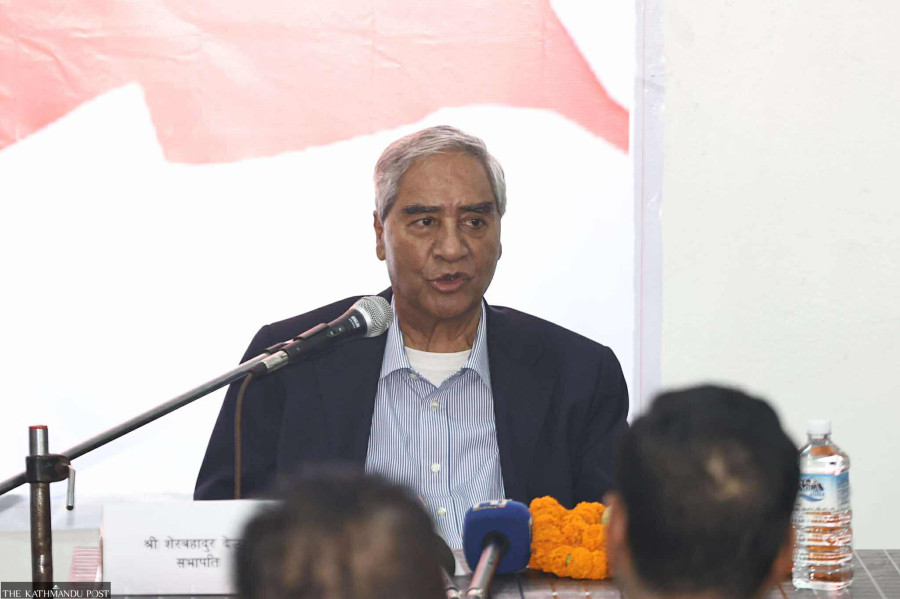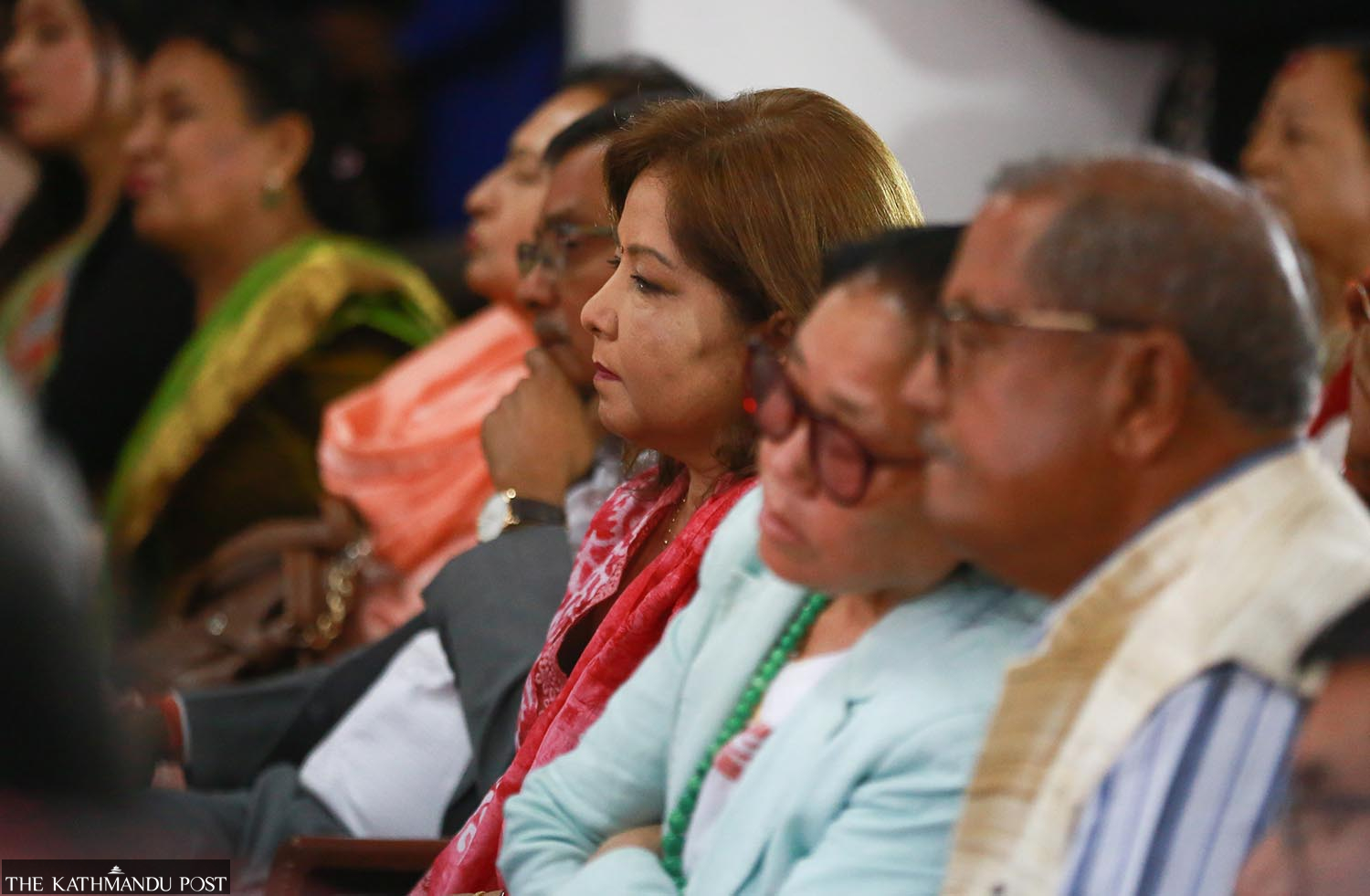Politics
Deuba steps aside as Congress chief in the wake of Gen Z protest
More than 54 percent of Nepali Congress representatives push for a special convention to elect new leadership.
Anil Giri
Nepali Congress President Sher Bahadur Deuba, whose house was set on fire and who, along with his wife Arzu Rana Deuba, was physically attacked and injured by an angry mob during anti-corruption protests on September 9, appeared on Tuesday at the party's central working committee meeting. He announced that he will no longer remain party president.
This marks an end of this six-decade-long active political career. According to party leaders, however, he will still have a big say in picking the new leadership.
Meanwhile, sources close to Deuba told the Post that Deuba and his wife may soon go to Singapore or Thailand for treatment. Singapore is their preferred destination, they said. Since the September 9 attack, Deuba has been complaining of dizziness and other health complications, the source said. Deuba was attacked in the back of his neck with a sharp object.
While addressing the party’s central working committee meeting, Deuba handed over the responsibility of acting president to Purna Bahadur Khadka, the party’s vice president, whose task will be to organise the party’s 15th general convention.
Deuba and his wife Arzu appeared for the first time on Tuesday at party headquarters, Sanepa, Lalitpur following the mob attack. They sustained injuries during the attack and were later rescued by the Nepali Army.
Following the Gen Z-led anti-corruption movement, Deuba was under pressure to step down from the party’s leadership role. The party’s two general secretaries, Gagan Thapa and Bishwa Prakash Sharma, along with senior leader Shekhar Koirala and others, had piled pressure on Deuba to quit and pave the way for holding the 15th general convention by the end of December.
General Secretary Thapa stated that Tuesday marked party President Sher Bahadur Deuba’s final participation in the central working committee meeting.
Speaking to leaders and party members present at the party’s central office, Thapa said that President Deuba participated in and addressed the central working committee meeting for the last time.
“The party president has stepped down, leaving the remaining responsibilities to the central working committee,” he said. “He also gave important directives and made announcements in his capacity as party president. Out of respect for that, today’s meeting did not enter a formal agenda.”
He said that after Deuba’s address, there was a discussion with the acting president Khadka, and since it was the president’s final address at the party office in that capacity, the meeting was concluded in order to respect that occasion.
Thapa said that during their discussions, the party president stated that the 15th general convention would be held within the scheduled time. “By ‘within the scheduled time,’ we understand it to mean by the end of December.”
The party is currently debating whether to convene a regular convention or a special convention.
As many as 54 percent convention representatives have signed a petition in support of a special general convention. At the party’s 14th general convention in 2021, there were 4,743 convention representatives. After deducting those who automatically became representatives from the 13th General Convention to the 14th as central members, as well as those who have left the party or passed away, the current number stands at 4,556 representatives.

Out of these, 2,487 have signed in favour of holding a special general convention. But the establishment faction led by Deuba argues that preparations to hold the general convention by December are not enough. It has been calling for holding a convention in line with the timeline for general elections scheduled for March.
General secretaries Thapa and Sharma disagree and insist that if a regular general convention is not held by mid-December, the party must proceed with a special general convention.
Those in favour of a special general convention represents 54.58 percent of the total active representatives. The collected signatures will be submitted to acting president Khadka at the party’s central office on Wednesday, said Thapa.
“With the president’s graceful exit, the way is now clear for holding the general convention,” Thapa told the Post. “We will propose in the upcoming central working committee meeting to hold the convention by mid-December, the cut-off date when the terms of all elected party bodies will expire.
“I will table a new short-cut plan to hold the convention by mid-December at Thursday’s meeting,” said Thapa. “Since the CPN-UML and CPN (Maoist Centre) are also looking to conclude their conventions by mid-December, why shouldn’t we?”
The central working committee meeting, scheduled to begin Thursday under Khadka’s leadership, will decide whether the party should summon a special or regular convention. The current terms and mandate of all elected party bodies are set to expire by mid-December. But as per the party charter, the party can extend the term and mandate by a year in special cases, and by another six months if the general convention cannot be held on schedule.
But this time, the Congress does not have the luxury to extend the term and mandate. “As the UML and Maoist Centre have already decided to hold their general conventions by mid of December [in view of the March elections], we cannot wait,” said a leader close to the Thapa-Sharma camp.
As per the party charter, if 40 percent of convention delegates make a written request for a special convention, the central working committee must call the convention.
Senior party leader Krishna Prasad Sitaula, citing the party statute, said that no one, from central to district presidents, can remain in their positions for more than two terms.
“Deuba had already said he would not be a candidate for president in the 15th general convention, so the upcoming convention will indeed see the transfer of party leadership,” said Sitaula.
Several leaders, including Sitaula, Prakashman Singh, Bimalendra Nidhi, Shashanka Koirala, Gopalman Shrestha, Prakash Sharan Mahat, have been asking Deuba to back a single candidate for party president. Deuba, however, is yet to reveal his choice.
On Tuesday morning, General Secretaries Thapa and Sharma held separate talks with Deuba and pressed him to announce the 15th general convention. “But Deuba declined to do so,” a leader close to Deuba said.
Thapa and Sharma urged Deuba to step down from the leadership and hand over responsibility to the acting president, announce that the general convention will be held by December and commit to the general elections on March 5, 2026, as announced by the government.
Deuba hinted to both Thapa and Sharma that he will hand over the role of acting president to Khadka, but the secretary duo’s plan to submit the signatures was postponed. As per the understanding, Deuba reiterated that he will transfer leadership by holding the general convention as per the party statute.
On Wednesday, the Central Executive Committee is scheduled to meet to finalise the agenda for Thursday’s central working committee, which in turn is expected to settle the row over a special convention versus a regular convention. Some leaders from the Deuba faction stated that the party should hold the general convention after the March elections due to time constraints.
Speaking at Tuesday’s meeting, Deuba said leadership is not permanent and reiterated that, according to party rules and his own decision, he will step down. “From the upcoming 15th General Convention, someone other than me will be the party president. There is no doubt about that.”
Deuba presented a 13-page written statement covering the events of the Gen Z uprising, the attack on him and his wife, the dissolution of parliament, the formation of the government, and the announcement of elections. In it, he also recalled the achievements made during his tenure as prime minister. He said that even when adding up all his terms, he has not served as prime minister for more than five years.
“I mostly led election-time governments. Still, you all are aware that I was able to make landmark contributions in certain areas,” Deuba said in his parting remarks.
He recalled several transformative steps taken during his time in office, such as liberation of Kamaiya (bonded labourers), the declaration of Nepal as free from untouchability, and initiation of various social transformation efforts. Deuba specifically highlighted the Anti-Corruption Act of 2059 (2002), which was introduced during his term as prime minister, as a key achievement in fighting corruption.




 19.12°C Kathmandu
19.12°C Kathmandu















